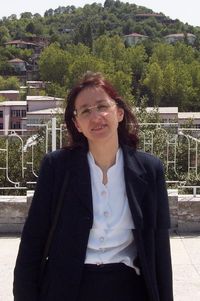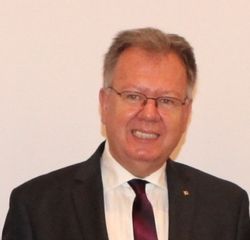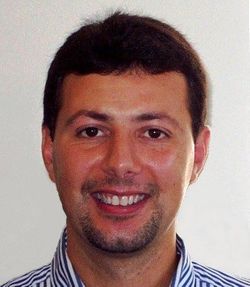

The Adventure of Machine Learning
Prof.Dr. Fatos T. Yarman Vural
One of the fields of computer science is to develop thinking, learning and problem solving systems. Although our efforts in this area sometimes result in great disappointments, we do not give up. We are trying to develop more intelligent and resourceful machines. Here, Machine Learning is the adventure of mankind's racing his own intelligence with his own machines.
Machine Learning has recently been transformed into a new area called Deep Learning. Scientists who research in the field of Deep Learning model these processes by studying the cognitive processes of living things and develop algorithms that can learn using these models.In this speech, the process of machine learning to deep learning will be explained and the theoretical and technological end point of this field.In addition, the philosophical, sociological and ethical problems of Deep Learning technologies will be discussed.
Prof. Dr. Fatos T. Yarman Vural received his BS degree from Istanbul Technical University, Electrical Engineering Department in 1973, MS degree from Bogazici University in 1975 and PhD from Princeton University in 1982. After working at TUBİTAK-Marmara Research Institute between 1982-1985, she worked as a visiting professor and researcher at the Massachusetts Institute of Technology and Drexel University between 1985-1987. Between 1987 and 1992, she worked as the General Manager of Yapıtel Inc.
Fatos T. Yarman Vural worked as the Head of Department between 1996-2000 and also as a assistant to rector for 2000-2008. She was representative of Turkey in NATO Research Panel during 2004-2007.She held more than 100 scientific meetings during her academic life. She has published around 200 national and international articles and papers on the fields of Computer Vision, Image Processing, Machine Learning, Artificial Intelligence and Human Brain. Fatoş T. Yarman Vural is the mother of Derviş Can Vural and the wife of Hüseyin Vural.

Subspace Methods and Finance Applications
Prof.Dr. Ali N. Akansu
Subspace methods spanning from principal component analysis (PCA) and Karhunen-Loeve transform (KLT) to wavelet transform have been successfully used in applications including face recognition, facial emotion analysis, image/video compression, recommending systems and many others. In this talk, we will revisit the mathematical concepts underlying these powerful analytical tools and emphasize a unified perspective for their use in signal decomposition and time-frequency analysis. Then, we will focus on eigensubspace of normalized returns for a basket of assets and present the methodology to design their eigenportfolios for financial investments. We will present and compare performances of Minimum Variance, Market (Markowitz) and Eigen Portfolios for US Equities to highlight the merit of the latter.
Ali N. Akansu received his B.S. degree from the Technical University of Istanbul, Turkey, M.S. and PhD degrees from the Polytechnic University, Brooklyn, New York, all in Electrical Engineering. He has been with the New Jersey Institute of Technology since 1987 where he is Professor of Electrical & Computer Engineering. He was a Founding Director of the New Jersey Center for Multimedia Research and NSF Industry-University Cooperative Research Center for Digital Video. Dr. Akansu was the Vice President for Research and Development of IDT Corporation [NYSE:IDT]. He was the founding President and CEO of PixWave, Inc., and Senior VP for Technology Development of TV.TV (IDT subsidiaries). He has sat on the boards of several companies and an investment fund. Dr. Akansu is a Fellow of the IEEE.

Cyber-Physical Systems: Smart Technologies and Challenges
Prof. Sofiène Tahar
Due to major breakthroughs in software and engineering technologies, embedded systems are increasingly being utilized in areas ranging from aerospace and next-generation transportation systems, to smart grid and smart cities, to health care systems, and broadly speaking to what is known as Cyber-Physical Systems (CPS). A CPS is primarily composed of several electronic, communication and controller modules and some actuators and sensors. The mix of heterogeneous underlying smart technologies poses a number of technical challenges to the design and more severely to the verification of such complex infrastructure. In fact a CPS shall adhere to strict safety, reliability, performance and security requirements, where on needs to capture both physical and random aspects of the various CPS modules and then analyze their inter-relationship. Oftentimes however, system bugs remain uncaught during the analysis and in turn cause unwanted scenarios that may have serious consequences in safety critical applications. In this keynote talk, we introduce some of the challenges surrounding the design and verification of contemporary CPS with the advent of smart technologies. In particular, we will introduce recent developments in the use of formal methods for the modeling, analysis and verification of CPS and display a few real world CPS case studies using physical components based on photonics integrated circuits.
Sofiène Tahar is Professor and Senior Research Chair in the Department of Electrical and Computer Engineering at Concordia University, Montreal, Quebec, Canada. He received his PhD degree in Computer Science with “Distinction” in 1994 from the University of Karlsruhe and his Diploma degree in Computer Engineering in 1990 from the University of Darmstadt, Germany. Prof. Tahar is founder and director of the Hardware Verification Group at Concordia University. He has made contributions and published over 400 papers in the areas of formal hardware verification, microprocessor and system-on-chip verification, analog and mixed signal circuits verification, VLSI design automation, and formal probabilistic, statistical and reliability analysis of systems. Prof. Tahar has received several awards and distinctions, including in 2007 Concordia University’s Senior Research Award earning him the title of University Fellow. In 2010, he was the recipient of a national Discovery Accelerator Award, given to the top 100 researchers in Canada in engineering and sciences. He is member of the Order of Engineers of Quebec, Senior member of IEEE and Senior member of ACM.